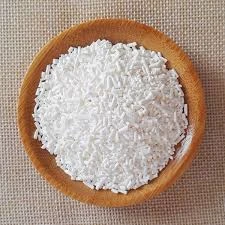
Understanding TCCA Chlorine Uses, Benefits, and Safety Guidelines for Effective Treatment
Understanding TCCA Chlorine Applications and Importance
Trichloroisocyanuric acid, commonly known as TCCA, is a widely used chlorine compound with significant applications in water treatment and sanitation. As a potent disinfectant and algaecide, TCCA plays a crucial role in maintaining water quality, particularly in swimming pools, industrial processes, and municipal water systems. This article will explore the properties of TCCA, its applications, and the importance of chlorine in public health.
Properties of TCCA
TCCA is a granular, white solid that is highly soluble in water. It contains about 90% available chlorine, making it one of the most concentrated chlorine sources available. Thanks to its stable nature, TCCA can be stored for extended periods without significant degradation, making it a reliable choice for various applications. Additionally, the compound releases chlorine gradually, allowing for a sustained disinfection effect when added to water.
Applications of TCCA
1. Swimming Pools One of the most common uses of TCCA is in the maintenance of swimming pools. The compound effectively kills bacteria, viruses, and algae, ensuring that the water is safe and clean for swimmers. By maintaining proper chlorine levels using TCCA, pool owners can prevent the proliferation of harmful microorganisms that can cause illness.
2. Industrial Water Treatment TCCA is also employed in industrial water systems, including cooling towers and boiler systems. These systems are prone to biofouling due to organic growth, which can reduce efficiency and lead to costly repairs. By regularly dosing TCCA, operators can control microbial growth and maintain optimal performance.
tcca chlorine

3. Drinking Water Disinfection In municipal water treatment facilities, TCCA serves as a reliable source for disinfecting drinking water. It helps eliminate pathogens, ensuring the water is safe for public consumption. The use of TCCA in water supply systems contributes significantly to preventing waterborne diseases, which can have devastating effects on communities.
4. Agricultural Uses TCCA is also utilized in agriculture for disinfecting irrigation water and controlling algae in water reservoirs. Proper sanitation in agricultural water systems helps reduce the risk of crop contamination and ensures better yield and quality.
Importance of Chlorine in Public Health
Chlorine, and by extension TCCA, is an essential tool in promoting public health. The disinfecting properties of chlorine have been pivotal in reducing the incidence of waterborne diseases such as cholera, typhoid fever, and dysentery. By effectively managing water quality, chlorine contributes to the overall health of populations, particularly in areas where access to clean water is limited.
Moreover, the implementation of TCCA in various sectors not only ensures safe water but also enhances quality of life. Clean water is fundamental to economic development, social stability, and environmental sustainability. As such, the responsible use of TCCA and other chlorine compounds is integral to long-term public health strategies.
Conclusion
In summary, TCCA is a vital chlorine compound with numerous applications across various industries. Its role in water treatment, sanitation, and public health cannot be overstated. As communities continue to grapple with the challenges of maintaining water safety and quality, the importance of effective chlorine treatments like TCCA will remain paramount in safeguarding public health and ensuring a clean environment.
-
Pure Sodium Dichloroisocyanurate Dihydrate | Powerful DisinfectantNewsAug.29,2025
-
Industrial Chemicals: Quality & Purity for Every IndustryNewsAug.28,2025
-
Nitrile Rubber Honoring Strict Production StandardsNewsAug.22,2025
-
Aspartame Ingredients Honoring Food Safety ValuesNewsAug.22,2025
-
Fertilizer for Balanced Plant NutritionNewsAug.22,2025
-
Cyanide Gold Processing with High Purity AdditivesNewsAug.22,2025
-
Formic Acid in Textile Dyeing ApplicationsNewsAug.22,2025
Hebei Tenger Chemical Technology Co., Ltd. focuses on the chemical industry and is committed to the export service of chemical raw materials.
-

view more DiethanolisopropanolamineIn the ever-growing field of chemical solutions, diethanolisopropanolamine (DEIPA) stands out as a versatile and important compound. Due to its unique chemical structure and properties, DEIPA is of interest to various industries including construction, personal care, and agriculture. -

view more TriisopropanolamineTriisopropanolamine (TIPA) alkanol amine substance, is a kind of alcohol amine compound with amino and alcohol hydroxyl, and because of its molecules contains both amino and hydroxyl. -

view more Tetramethyl Thiuram DisulfideTetramethyl thiuram disulfide, also known as TMTD, is a white to light-yellow powder with a distinct sulfur-like odor. It is soluble in organic solvents such as benzene, acetone, and ethyl acetate, making it highly versatile for use in different formulations. TMTD is known for its excellent vulcanization acceleration properties, which makes it a key ingredient in the production of rubber products. Additionally, it acts as an effective fungicide and bactericide, making it valuable in agricultural applications. Its high purity and stability ensure consistent performance, making it a preferred choice for manufacturers across various industries.





